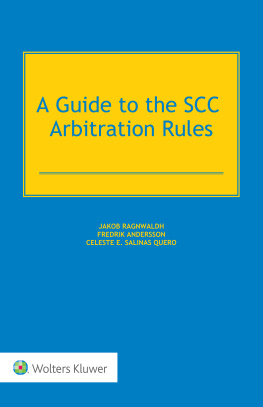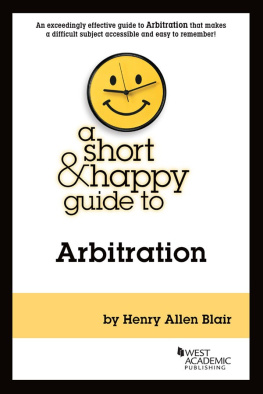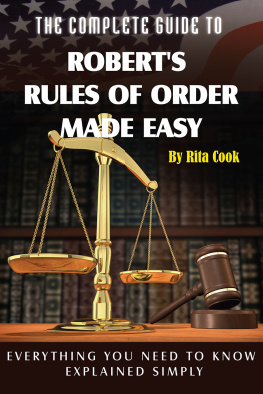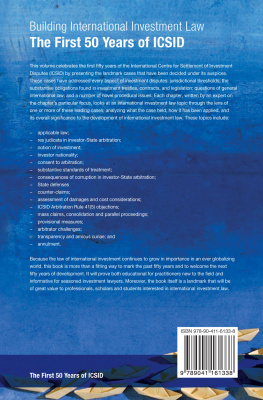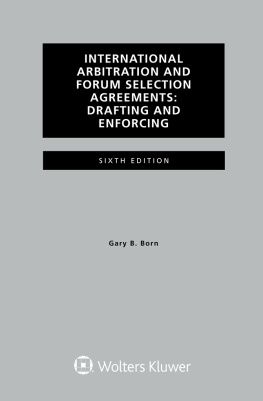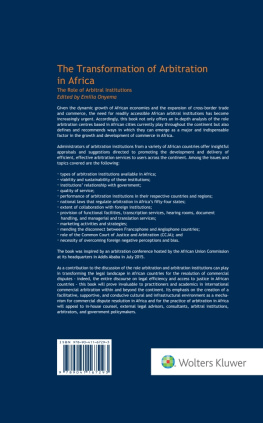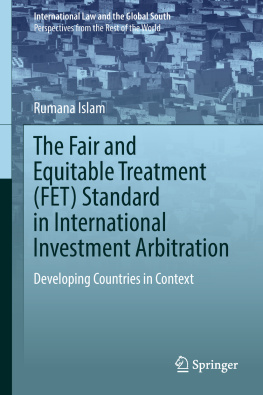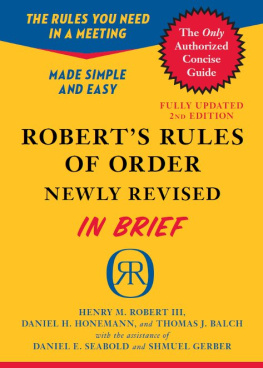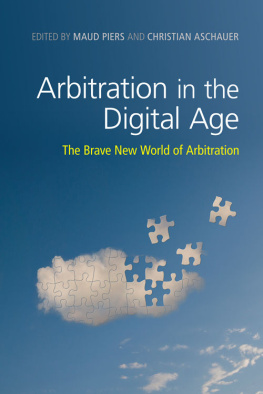A Guide to the SCC Arbitration Rules
A Guide to the SCC Arbitration Rules
Jakob Ragnwaldh
Fredrik Andersson
Celeste E. Salinas Quero

Published by:
Kluwer Law International B.V.
PO Box 316
2400 AH Alphen aan den Rijn
The Netherlands
E-mail:
Website: lrus.wolterskluwer.com
Sold and distributed in North, Central and South America by:
Wolters Kluwer Legal & Regulatory U.S.
7201 McKinney Circle
Frederick, MD 21704
United States of America
Email:
Sold and distributed in all other countries by:
Air Business Subscriptions
Rockwood House
Haywards Heath
West Sussex
RH16 3DH
United Kingdom
Email:
The SCC Arbitration Rules are reproduced with the written permission of the Arbitration Institute of the Stockholm Chamber of Commerce.
Celeste E. Salinas Quero is Counsel at the International Centre for Settlement of Investment Disputes (ICSID). The views expressed in the book are those of the author and do not necessarily reflect the views of ICSID.
ISBN 978-90-411-4040-1
e-Book: ISBN 978-90-411-4690-8
web-PDF: ISBN 978-90-411-9094-9
2020 Kluwer Law International BV, The Netherlands
All rights reserved. No part of this publication may be reproduced, stored in a retrieval system, or transmitted in any form or by any means, electronic, mechanical, photocopying, recording, or otherwise, without written permission from the publisher.
Permission to use this content must be obtained from the copyright owner. More information can be found at: lrus.wolterskluwer.com/policies/permissions-reprints-and-licensing
Foreword
What started as a local initiative by the Stockholm Chamber of Commerce in 1917 to meet the Stockholm regional grain industrys need for efficient alternative dispute resolution has since developed into a global phenomenon. Over the course of the last century, the Arbitration Institute of the Stockholm Chamber of Commerce has earned a reputation as a neutral, independent and impartial venue for resolving international disputes, supported by an efficient and arbitration-friendly judicial system. Today, parties from a wide spread of jurisdictions and industries choose the SCC to administer their disputes and its arbitration rules are familiar to arbitrators and legal counsel across the globe. The level of trust in Swedish arbitration is illustrated by the multitude of bilateral investment treaties over 120 in number that provide for investor-state dispute resolution in Sweden or at the SCC. In addition, the SCC is one of three options for investor-state disputes under the Energy Charter Treaty, together with the UNCITRAL Arbitration Rules or arbitration under the auspices of ICSID.
It is no coincidence that many of the successful arbitral institutions in the world today have their origins, as the SCC does, in chambers of commerce. One of the key goals of a chamber of commerce is to foster strong local economies with national and international ties to ensure healthy and peaceful communities. To support this, chambers have been at the forefront of the drive for reliable and enforceable legal frameworks for commerce, including arbitration. International arbitration is used today on a daily basis by companies all over the world to safeguard their rights under contracts and law.
Business environments at the local, regional and global level are not only evolving at an ever-faster pace but are also becoming increasingly interconnected and interdependent. To meet the changing and increasingly complex needs of its users, arbitral institutions must continue to evolve and adapt to reflect the changes in the business environment as a whole and ensure that they continue to provide reliable rules for the effective enforcement of contracts.
It is against this backdrop that the SCC took the decision in 2014 to revise the SCC Rules. As an institution, the SCCs constant ambition is to provide our users with state-of-the-art dispute resolution services to help them navigate the complex international business environment. We have therefore updated the SCC Rules to reflect both industry developments and modern practice as seen through the lens of SCC arbitrations while continuing to reflect international best practice. To ensure a seamless transition, we have ensured that the main features of the SCC procedure remain unaltered and returning users of the SCC Rules should therefore not feel lost in the updated 2017 SCC Rules environment. To ensure that our users also have the most effective tools for efficient dispute resolution, the SCC also recently launched the SCC Platform, a digital platform facilitating the secure communication and file-sharing between the SCC, the parties and the tribunal in SCC arbitrations.
In 2019, a number of amendments to the Swedish Arbitration Act came into force. Most of the changes were motivated by an ambition to further align the Swedish Arbitration Act with global trends and facilitate the use of arbitration in Sweden for international parties and their counsel. Altogether, the rules and regulations of arbitration in Sweden have been through a recent modernisation phase, reflecting Swedens continued role as an important venue for international disputes.
Given the changes to both the SCC Rules and the Swedish Arbitration Act, the publication of this guide to the SCC Rules is very timely. It also represents the first article-by-article commentary to the SCC Rules directed specifically at an international audience and is therefore a valuable addition to the bibliography on arbitration in Sweden.
On behalf of the SCC, we would like to extend our thanks to the authors of this book, who with great expertise and dedication have provided insightful, thorough and up-to-date descriptions and analysis. A Guide to the SCC Arbitration Rules fills an important gap and further enhances the understanding of arbitration in Sweden. It should be a valuable tool for anyone involved in international arbitration in Sweden under the SCC Rules in the future.
Annette Magnusson Kristin Campbell-Wilson
Secretary General Deputy Secretary General
Arbitration Institute of the Stockholm Chamber of Commerce
Preface
This book is intended to serve as a commentary to the 2017 Arbitration Rules of the Arbitration Institute of the Stockholm Chamber of Commerce. The commentary addresses the Arbitration Rules including their appendices. However, it does not comment on or address the specific features of the SCC Rules for Expedited Arbitrations, which are a separate set of rules that parties need to contract into in order for them to apply. Specific features of the Rules for Expedited Arbitrations include a limited number of submissions as well as shorter time limits for the parties to file their submissions and for the sole arbitrator to render an award.
The commentary has been written as an article-by-article commentary in the order in which they appear in the Arbitration Rules. It focuses primarily on how the Arbitration Rules are applied in practice and should therefore first and foremost be read as a practitioners guide. Although the majority of the cases administered by the SCC have their seat of arbitration in Sweden, the ambition has been to write a commentary which, as much as possible, should be able to be used irrespective of the seat of arbitration. In other words, this book should not be read as a commentary on Swedish arbitration law, although it does contain certain references to Swedish law in order to better explain the rationale and the proper context of certain articles of the Rules. There are many good sources on Swedish arbitration law, including in English, and some of them are referred to in footnotes throughout this book.
Next page
